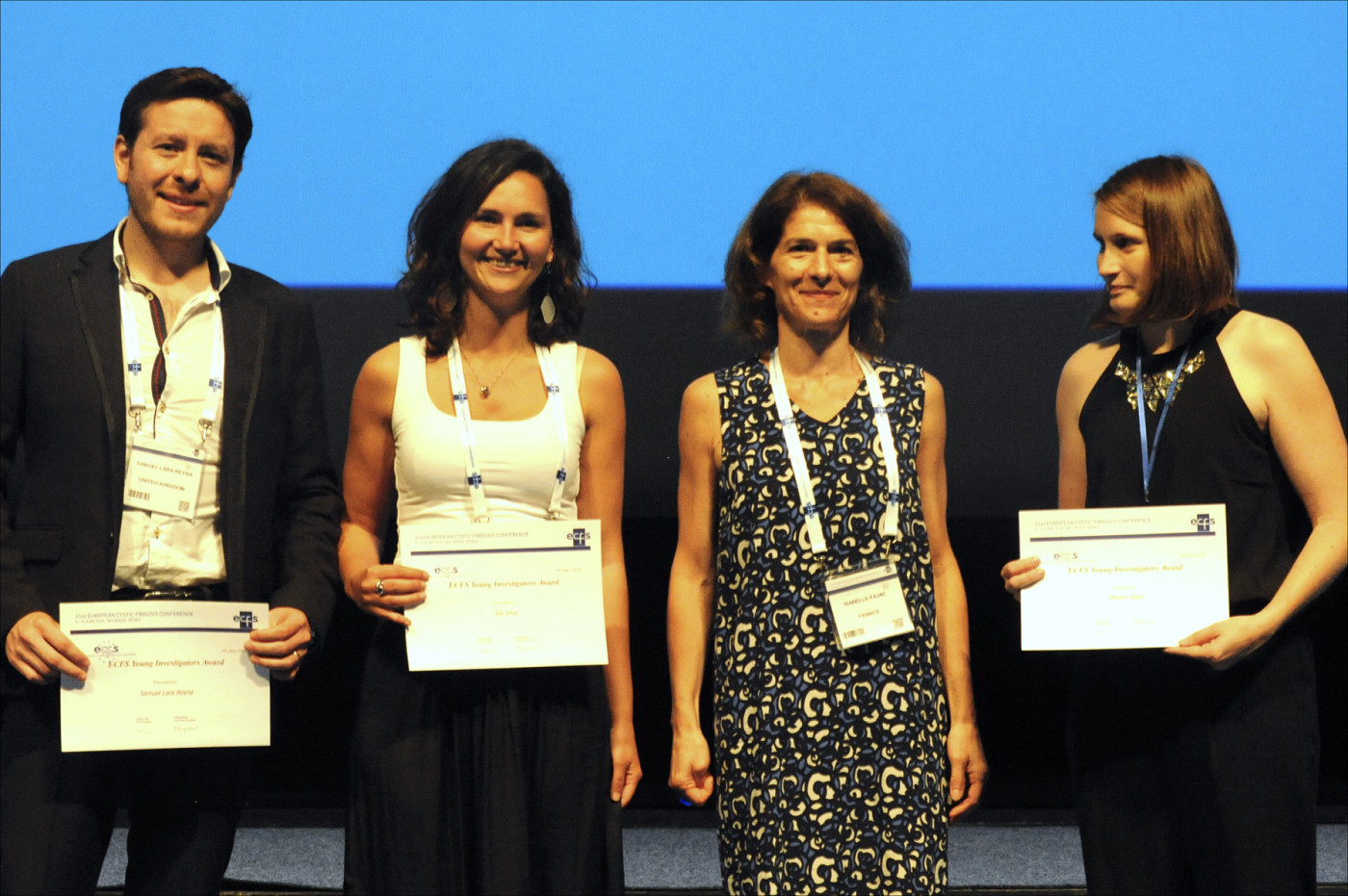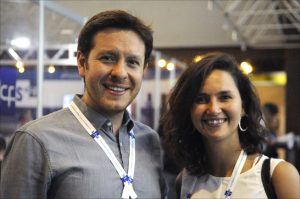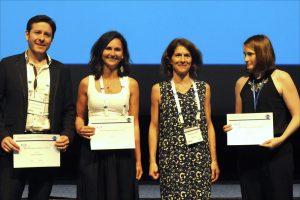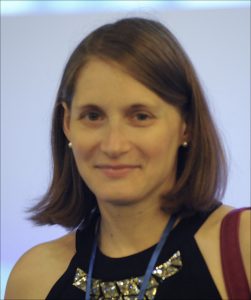#ECFS2018 – 3 Scientists Win 2018 ‘Young Investigators Awards’ for Innovative CF Research

From left: Mexico's Samuel Laera Reyna; Portugal's Iris Silva; ECFS President Isabelle Fajac and Germany's Mirjam Stahl.
The European Cystic Fibrosis Society presented three scientists — one Portuguese, one Mexican, and one German — with the organization’s 2018 “Young Investigators Awards” on June 9, the last day of its 41st European Cystic Fibrosis Conference (ECFS) in Belgrade, Serbia.
The winners are Iris Silva, Samuel Lara Reyna, and Mirjam Stahl. Each received a grant of €750 (about $884), and a 2018 ECFS membership subscription. The annual contest is open to researchers younger than 35 who submit their abstracts for review by the scientific committee of the ECFS.
Susan Madge, PhD, of London’s Royal Brompton Hospital, also received this year’s ECFS Award for making a significant contribution to the understanding, treatment or care of patients with cystic fibrosis. Likewise, Danish physician Tavs Quist won the annual Gerd Döring Award, which recognizes exceptional early-career European scientists and carries a monetary grant of €5,000 (about $5,900).
The Denmark-based ECFS also handed out 18 travel grants to outstanding scientists younger than 35 who are pursuing a PhD or post-graduate degree, or who have graduated within the past 12 months. The €300 grants (about $354) — which include free registration to the Belgrade meeting and a 2018 ECFS membership subscription — went to winners from Australia, France, Germany, Ireland, Israel, Italy, Poland, Romania, Russia, Turkey, the United Kingdom, and the United States.
Iris Silva
Iris Silva, 29, is from the southern coastal city of Tavira in Portugal. She started her science career in 2010 after joining a molecular biology lab at Portugal’s University of Algarve. In 2012, she began a PhD to analyze the mutations of bone patients with Paget’s disease, as part of a joint effort between her school and Canada’s Centre Hospitalier Universitaire du Québec.
For the past year-and-a-half, Silva has focused on several CF-related projects, such as the recently approved “HIT-CF” that aims to extend the use of approved CF therapies to patients with more rare mutations (called a label extension).
“I’ve been working with nasal cells, with intestinal organoids and with rectal biopsies. My work has been how to correlate all these cells from the same patients and see if we can characterize their mutations and their response to drugs,” she said.
Silva’s team concluded that the characterization of rare CFTR mutations can be determined best by using combined data from patient samples and cellular models, working toward a more personalized therapy approach.
“What I would really like is to have more data,” she said. “There’s a lack of data on how modulators correlate with clinical benefit. I think the modulators are working fine, however, it’s very hard to get access to those drugs in Europe. Although we know a patient may benefit from a drug, they cannot get access because it’s too expensive.”
Silva said her country, Portugal, is home to between 400 and 500 CF patients, but that “none of these drugs are approved [on the public health system], mainly because of the high cost to the government. In the Netherlands, they have already been approved. It’s all [a] matter of money.”
Disease-modifying treatments like Vertex‘s Kalydeco and Orkambi are approved by the European Medicines Agency (EMA); as such, they are available to patients throughout the European Union. But each country decides whether such treatments will be included in its public health plan and available at reduced or no cost.
Samuel Lara Reyna
Born and raised in the northern Mexican city of Torreón, Samuel Lara Reyna studied medicine at Universidad Juarez Estado Durango, later earning a bachelor’s degree in molecular biology from the University of Texas at San Antonio.
He then received a scholarship from Mexico’s Consejo Nacional de Ciencia y Tecnología (Conacyt) — a government agency that promotes science and technology — to attend England’s University of Birmingham, where he earned a master’s in immunology and immunotherapy.
Lara Reyna, 29, is now earning his PhD at the University of Leeds, where he’s investigating the unfolded protein response in CF.
“This is a cellular mechanism to get rid of stress,” he explained. “When the cells are exposed to stress, they activate this particular mechanism to relieve the stress and go back to a healthy state. I’m looking into how that involves inflammation. When this process is overactive, it promotes chronic inflammation in several disorders.”
Lara Reyna’s supervisor is Daniel Peckham, a team leader of the CF Strategic Research Center at the University of Leeds. His research is largely funded by Cystic Fibrosis Trust UK.
The young scientist said he hopes to return to Mexico to continue his research.
“CF is not really well-diagnosed in Mexico. We lack the quality they have here in Europe or in the United States,” he said. “I’m open to different possibilities. It all depends on where the good projects are, and where I get funding from.”
Mirjam Stahl
A native of Koblenz, Germany, pediatrician Mirjam Stahl received her medical degree from the University of Freiburg in November 2008. She has worked at the pediatric pulmonology division of University Children’s Hospital in Heidelberg since 2009.
The hospital, which hosts one of Germany’s largest cystic fibrosis centers, treats more than 300 CF patients, including 120 children. Stahl takes care of 75 of those youngsters.
Stahl, 34, began her study six years ago, and is looking at a preventive inhalation treatment of 6 percent hypertonic saline versus isotonic saline in CF infants starting at four months of age.
“We found that this was very effective and safe in the mouse model. It reduced mucus obstruction of the airways, it increased survival of the mice, and it led to better weight gain. They were thriving just like normal mice,” she said.
“We’ve already translated that study into humans. CF lung disease starts very early in the first few months of life, so you have just a narrow window of opportunity for preventive strategies,” she added. “You can’t prevent CF from developing, but you can hopefully prevent the early onset of CF lung disease by shifting it to later years.”
Stahl said the average life expectancy for a CF patient in Germany today is 44 years.
“In Eastern Europe, many people with CF are dying in their 20s. This is what happened in Western Europe many years ago,” said Stahl, who spends half her time in the lab and the other half treating her patients. “I’m interested in doing any research that can make lives better for people with cystic fibrosis.”










